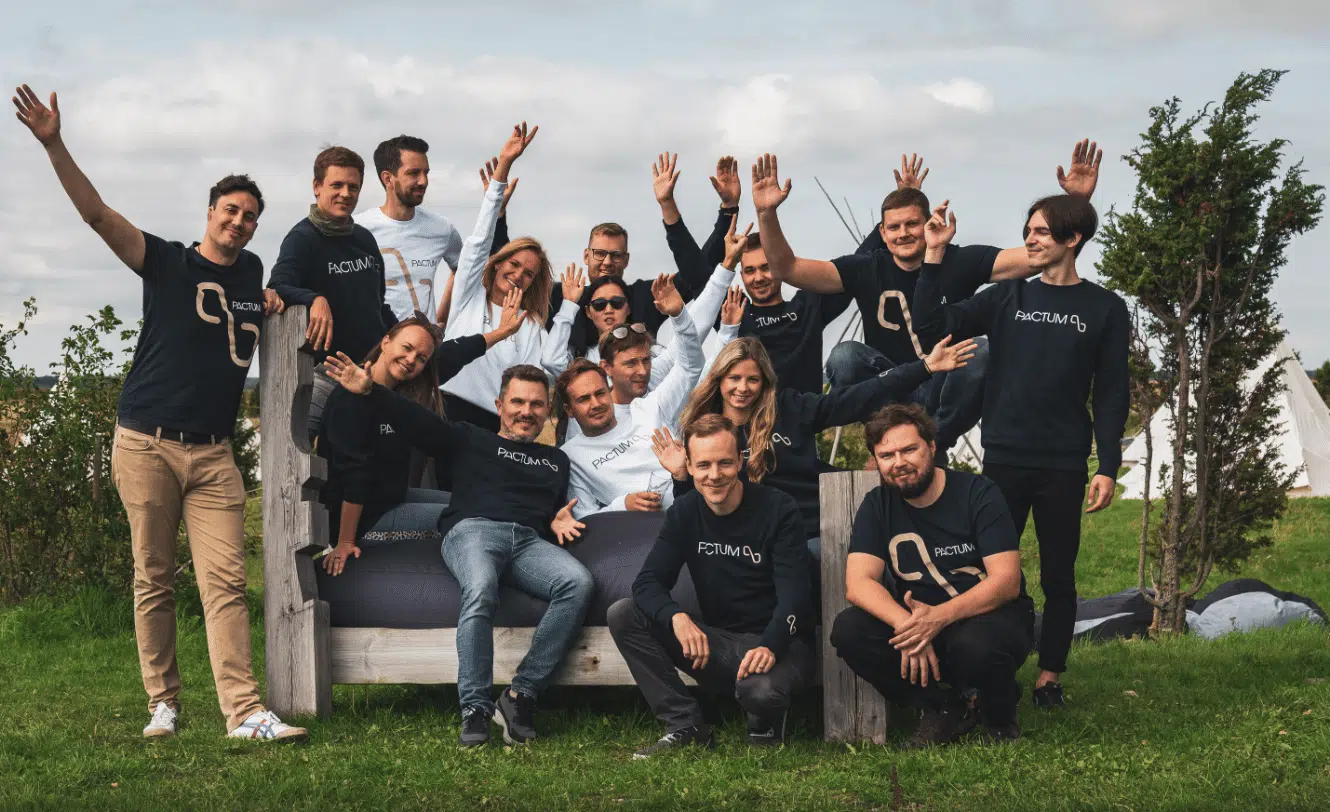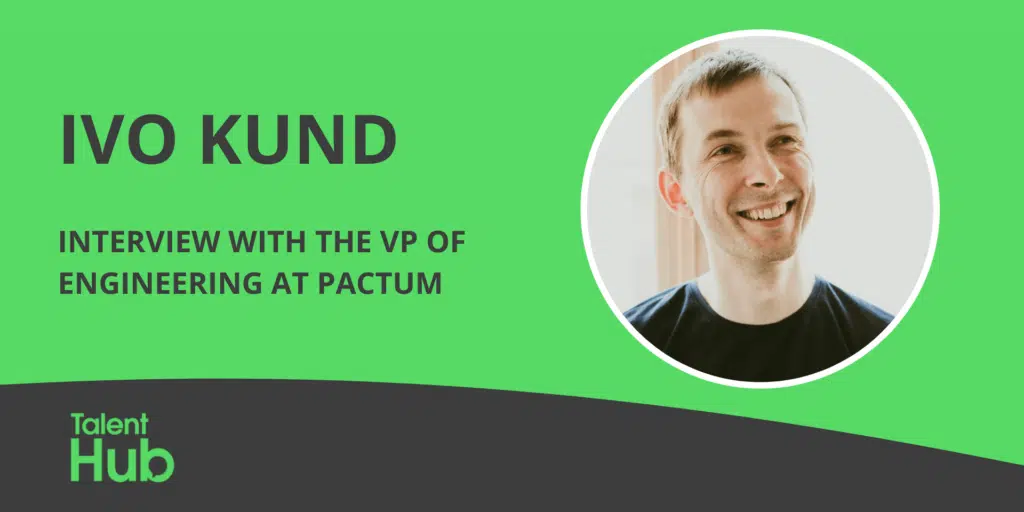Interview: Ivo Kund, VP of Engineering at Pactum
Pactum is an Estonian-founded start-up that uses artificial intelligence and a chat-like interface to automate supplier contract negotiations. Founded in 2019, the company is already conducting autonomous contract negotiations for many Fortune 500 companies including Walmart and shipping giant Maersk Group.
Recently, we had a chance to get to know their VP of Engineering, Ivo Kund. In this article, we asked Ivo how are the tech teams structured at Pactum, what his day-to-day looks like, what’s the company culture like, and much more.
Let’s jump right into it!
What made you join Pactum?
Looking back, it was one of the most difficult decisions of my professional life. At the time, I had been working at Starship Technologies for a year. I was just getting started there and we were having fun and growing. Yet, me and Kristjan (Co-Founder and CTO at Pactum), have a history of creating start-ups together. So, when he came to me with this idea, I couldn’t say no. What made me join is the team behind Pactum, as well as the genius idea to use artificial intelligence to automate negotiations.
What does your day-to-day look like as a VP of Engineering?
It varies. When I joined Pactum, our tech team consisted of three people. Today, the number has grown to 25. At the start, I could write more code myself, but nowadays I’m working on finding and meeting the best talent. I don’t like to get too far away from the technical side of things, so I still try to write some code every week. But it’s mostly about keeping people happy and making sure the communication flows well within the team.
How are the technology teams structured at Pactum and what kind of challenges do these teams face daily?
We have five technology teams: Infrastructure, Security and Compliance, Data, Platform, Implementation.
For the infrastructure team, the main challenges are to automate as many things as possible and to make sure services are observable, up and running. Also, we must meet the demands of our clients, so we must be ready for any random change or requirement, and be able to deploy anywhere fast.
The security and compliance team works directly with the Fortune 500 clients that we have, and their main challenge is to make sure we provide world-class security by checking all the boxes for their requirements.
The data team has a unique role in Pactum. Since we are automating negotiations, something that hasn’t been ever done before, one of their roles is to invent ways to understand if the negotiations are going well or not. This is more difficult than you would imagine.
Our platform team works on all the tools that we have, both internal and external. These are all the development tools we use to create the negotiations, operational tools we use to manage all this, and the chat that suppliers use.
Finally, the implementation team works with all the tools that are developed by the platform team. They are responsible for creating the actual negotiations with the customers and understanding the strategy behind it.
Which programming languages do you use daily at Pactum?
Our code is written in TypeScript and Kotlin. For the front-end, we use React. In the data team, Python is the main technology.
What are the personal growth opportunities at Pactum?
At Pactum, it’s simple. Every year, we grow rapidly, which means we have new teams that need team leads. Also, we need more and more exceptional engineers to make sure the architecture stays solid. Four months ago, we only had one engineering team – called Technology, now, we have five different teams. The landscape is changing so quickly that there’s growth for everybody. We created our latest team just last week and we aim to double in size this year.
Besides that, here you also have a chance to work with the largest companies in the world. It gives you a unique insight into the global commercial landscape.
What are the most exciting things you are currently working on at your job?
The most exciting part for me personally is creating the development tools for our people.
Since there is no integrated development environment (IDE) for negotiations, we need to create one ourselves. There aren’t many companies where you can work on creating an IDE for other engineers.
All these internal tools are actually a huge part of what we do, even though the only externally visible part is just our chatbot.
How would you describe the culture at Pactum?
Our culture is something that we’ve been consciously working on from day one. We want to make engineering and development fun and stress-free for our employees, so we invest time and resources into that.
I’d say what describes us best is that we’re independent thinkers who take ownership of their projects. We have a big sense of team spirit – everyone knows what’s our mission, Objective and Key Results (OKRs), and where we want to go. We have a pretty flat organizational structure so we don’t have a lot of management either.
Another trait that describes our culture well is openness. I’ve never worked at a place where every single person is so approachable and friendly as here.

Is your team remote? If so, how do you make sure your team collaborates effectively?
Yes, our team consists of 65 people and most of them are working remotely. However, our tech team is based in our Tallinn office. We don’t require people to be in the office every day, but most of us still want to come. Our office has always been a nice place to work from and we have a lively environment. I guess it’s because we want to do true innovation and world-changing things, and for that, we need some face-to-face whiteboard collaboration time. But of course, if people want to spend a month or two working from, for example, Spain, it’s not a problem.
In terms of offices, we are currently planning to move to Rotermanni in Tallinn, Estonia. We also have a co-working space in Tartu.
What do you look for in candidates?
For me, the most important traits are the ability to communicate and take ownership. At Pactum, we don’t have programmers – we have engineers who solve problems. Some of these problems need coding, some don’t. We don’t overvalue tech stacks and languages – those are merely tools. Instead, it’s more important that the candidate can understand, analyze and bring solutions to problems.
How would you describe your leadership style?
I don’t think I have a specific style. I try to help as many people as possible and be a normal human being.
What’s one cool thing about working at Pactum that many people probably don’t know?
Many people think we only do some experimental stuff. In reality, we have a working product that’s up and running with several Fortune 500 companies and creating revenue for them.
Do you have any reading recommendations?
I read a lot so I’ve got many recommendations.
From science fiction, “The Expanse” series by James Corey. If you want hardcore science fiction, I’d recommend “The Three-Body Problem” by Liu Cixin.
But work-related, the classic one is “The Mythical Man-Month” by Fred Brooks. It has the most beautiful explanation of software engineering I’ve ever seen.
For start-up culture, “The Hard Thing About Hard Things” by Ben Horowitz is a good read.
“Algorithms to Live By” by Brian Christian and Thomas L. Griffiths is a good one if you want to explore how to apply computer algorithms to your everyday life.
And finally, “Life and How To Make It” by Steve Grand. I found out about it from the autobiography of Jeff Bezos who said he came up with the idea for AWS after reading this book. It’s very inspirational.
What should we expect from Pactum in the future?
I love our vision statement because I can often quote it in real life. It says: “There will be a day where Pactum’s autonomous negotiations will get you a better deal”. Even though we work with large enterprises now, we have a longer vision for expansion, after the technology has matured enough. For example, in a couple of years, after applying to a position and going through the interviews, you might be working with a Pactum bot instead of a human to iron out the best job contract terms for you.
It’s the perfect time to join us – the mess of early days is over, but it’s still early enough to have a significant impact on the future. Also, the part of growing too big is still very far ahead. We are creating a completely new category, and the potential of it is unimaginable.
Interested in working at Pactum? Contact our Recruitment Partner, Heveli Enok, to learn more about current job opportunities at the company.


